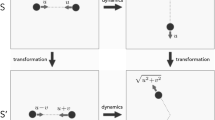Abstract
This paper gives a very simple canonical formulation of the relativistic dynamics of the mass point, making use of the fact that the four equations of motion determine not only the three independent components of the four-velocity, but the rest mass too. For the determination of these four unknowns there are four equations, the Lagrange function of which can be put into covariant form. By the aid of the method described in the present paper the equations of motion can be derived from a Lagrange function of general type even for such cases, where up to now only ad hoc solutions have been found. The relativistic equivalent of the classical potential can be interpreted generally. The absolute value of the relativistic potential is bounded in case it does not depend on the velocity. The relativistic wave equations can be derived from the classical relations in a way analogous to the non-relativistic case. The rest mass and the proper time are non-commutative quantities.
Резюме
В работе дано очень простое каниническое представление релятивистской динамики центра масс. Автор исходит из того, что четыре уравнения движения определяют, наряду с тремя независимыми компонентами четерехмерной скорости, и массу покоя.
Для определения этих четырех неизвестых имеется четыре уравнения, функция же Лагранжа, относящаяся к ним, получается ковариантной. С помощью рекомендуемого автором метода различные случаи, которые до сих пор рассматривались по отдельности, теперь разбираются совершенно универсаляно. Можкно задать вполне общее релятивистское понятие, соотвествующее классическому понятию потенциала. Абсолютное значение релятивистского потенциала, независящего от скорости, безусловно органичено. Релятивистские волновые уравнения квантовой механики можно выводить из классических соотношениях, точно как и в нерелятивистском случае.
Similar content being viewed by others
References
See. e. g.O. Bergmann, Introduction to the Theory of Relativity, Prentice-Hall, New York 1953.
A. Schild, Phys. Rev.,92, 1009, 1953.
K. Novobátzky, Ann. d. Phys.,11 (6), 285, 1953.
G. Szamosi andG. Marx, Acta Phys. Hung.,4, 219, 1954.
J. Werle, Bull. Ac. Pol., III1, 281, 1953.
G. Nordström, Phys. Zs.,13, 1126, 1912.
G. Marx, to be published.
L. Motz, Phys. Rev.,93, 901, 1954.
G. Szamosi, Acta Phys. Hung.,5, 463, 1956.
Author information
Authors and Affiliations
Rights and permissions
About this article
Cite this article
Szamosi, G. Variational principle and potential in relativistic dynamics. Acta Physica 6, 207–215 (1956). https://doi.org/10.1007/BF03157323
Received:
Issue Date:
DOI: https://doi.org/10.1007/BF03157323



